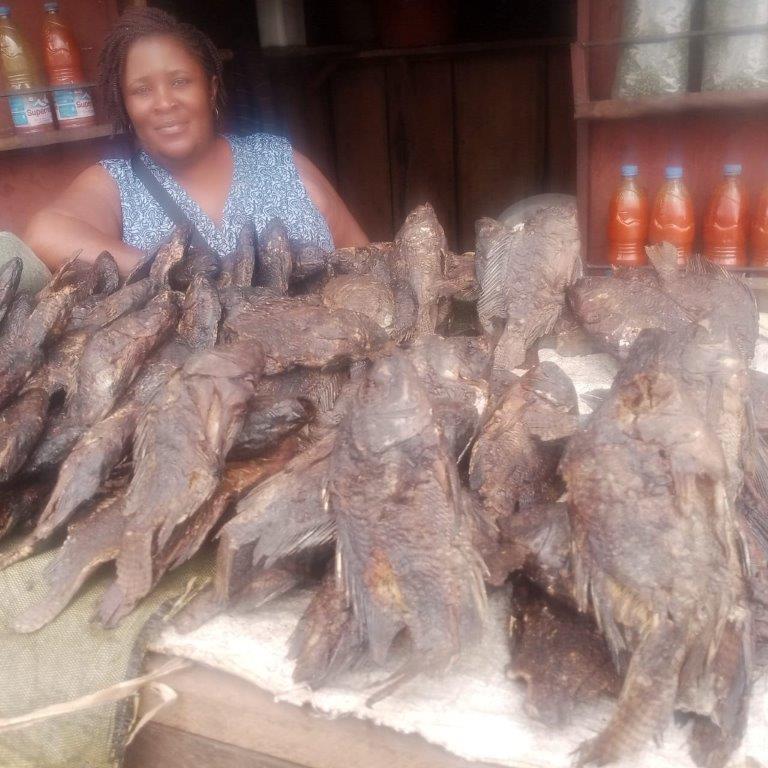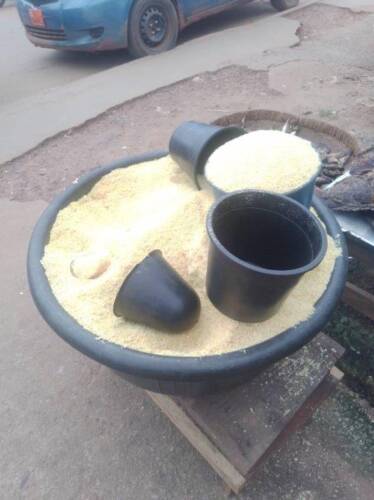The Anglophone crisis and Russian invasion of Ukraine continue to negatively impact food security and subsistence
By Jaff Bamenjo and Enjema Esunge | RELUFA
Nkah Ngu Loveline, a 42-year-old petti food stuff trader, originally from Bali-Nyonga in the Northwest Region of Cameroon, sells her goods in Obili, a popular neighborhood in Yaounde, the capital of Cameroon. For the past 10 years, Loveline has specialized in selling what she calls Bambalang fish, which is a smoked tilapia produced in Bambalang village (favored as a nutritious, flavorful fish), and tapioca, also known locally as “garri,” a staple food consumed in most homes in Cameroon. Loveline purchases the garri and Bambalang fish primarily from the Anglophone regions of Cameroon, but since the start of the armed conflict there in 2017, making a living off Bambalang fish and garri has become increasingly difficult due to the supply shortages and price increases.
Unfortunately, most of the fishermen and farmers in the Northwest and Southwest regions (Anglophone regions) have fled their villages due to the conflict and are now living in other locations as internally displaced persons (IDPs). Very few have remained in the regions to cultivate cassava for garri production or do the fishing. As a result, food prices have increased significantly due to the decrease in agricultural productivity and fishing activities.
Of course, the heaviest burden of the Anglophone conflict has been born by those displaced by the conflict. People who escaped to urban cities like Douala and Yaounde are suffering due to the high cost of living and inflation. Many IDPs have lost all their life savings and investments.
But the displacement of peoples from the Anglophone regions has also had far reaching consequences for ordinary Cameroonians, affecting their livelihoods and food security – preventing people from meeting their basic food needs. Conflicts are clearly a major cause of hunger and poverty worldwide, which is why RELUFA, the Joining Hands network in Cameroon, has been monitoring and advocating for an end to the conflicts in Cameroon and around the world.
The Russian invasion of Ukraine has also impacted food security in Cameroon. The problem of high food prices in has only been worsened by the increasing prices of fertilizers since Cameroon depends on Russian fertilizer imports. Cameroon also depends largely on wheat imports from Ukraine which has led to an increase in bread prices and a reduction in the size of loaves due to the Russian invasion. And now, Russia has announced its withdraw from the Black Sea grain deal which will continue to negatively impact local bread production in Cameroon. Disruptions to the flow of goods from Ukraine and Russia are driving up food prices and causing food shortages not only in Cameroon, but also in Chad, Nigeria, and many other African countries.
Before the Russian invasion of Ukraine, farmers could purchase a 20KG bag of fertilizer for $25 (15,000 FCFA), but today, the price for the same bag of fertilizer has increased threefold to about $83 (50,000 FCFAF). This exponential increase in the price of fertilizer is beyond reach for many local farmers and has resulted in decreased food production. Loveline says she now pays $17 (10,000 FCFAF) for a bag of garri that she previously was able to purchase for only $3 (2,000FCFA). Additionally, fuel price hikes in February of this year have increased the transportation costs of goods from villages to markets and therefore increased the overall costs of goods, causing additional stress for consumers.
Dialogue is the only sustainable way to end these conflicts. The time to engage in such dialogue is now. The more the world waits, the more it prolongs the suffering of ordinary people. We may sometimes feel helpless because no one seems to listen, but our strength is anchored in many people around the world who still care about the plight of others. Through our collective voices, to all those in the United Nations, governments, congresses or parliaments around the world, something can still be done to end the current spiral of violence in Cameroon, Ukraine, and elsewhere. Let us continue to advocate for peace in all circumstances because conflict harms us all.
The work of the Presbyterian Hunger Program is possible thanks to your gifts to One Great Hour of Sharing.

